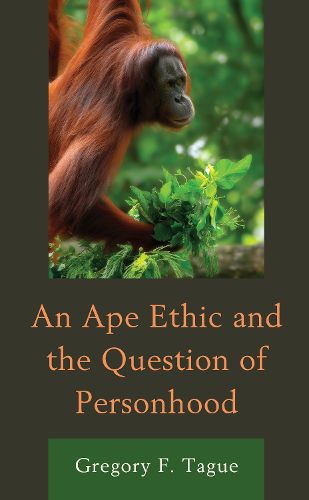Readings Newsletter
Become a Readings Member to make your shopping experience even easier.
Sign in or sign up for free!
You’re not far away from qualifying for FREE standard shipping within Australia
You’ve qualified for FREE standard shipping within Australia
The cart is loading…






Gregory F. Tague’s An Ape Ethic and the Question of Personhood argues that great apes are moral individuals because they engage in a land ethic as ecosystem engineers to generate ecologically sustainable biomes for themselves and other species. Tague shows that we need to recognize apes as eco-engineers in order to save them and their habitats, and that in so doing, we will ultimately save earth’s biosphere. The book draws on extensive empirical research from the ecology and behavior of great apes and synthesizes past and current understanding of the similarities in cognition, social behavior, and culture found in apes. Importantly, this book proposes that differences between humans and apes provide the foundation for the call to recognize forest personhood in the great apes. While all ape species are alike in terms of cognition, intelligence, and behaviors, there is a vital contrast: unlike humans, great apes are efficient ecological engineers. Therefore, simian forest sovereignty is critical to conservation efforts in controlling global warming, and apes should be granted dominion over their tropical forests. Weaving together philosophy, biology, socioecology, and elements from eco-psychology, this book provides a glimmer of hope for future acknowledgment of the inherent ethic that ape species embody in their eco-centered existence on this planet.
$9.00 standard shipping within Australia
FREE standard shipping within Australia for orders over $100.00
Express & International shipping calculated at checkout
Gregory F. Tague’s An Ape Ethic and the Question of Personhood argues that great apes are moral individuals because they engage in a land ethic as ecosystem engineers to generate ecologically sustainable biomes for themselves and other species. Tague shows that we need to recognize apes as eco-engineers in order to save them and their habitats, and that in so doing, we will ultimately save earth’s biosphere. The book draws on extensive empirical research from the ecology and behavior of great apes and synthesizes past and current understanding of the similarities in cognition, social behavior, and culture found in apes. Importantly, this book proposes that differences between humans and apes provide the foundation for the call to recognize forest personhood in the great apes. While all ape species are alike in terms of cognition, intelligence, and behaviors, there is a vital contrast: unlike humans, great apes are efficient ecological engineers. Therefore, simian forest sovereignty is critical to conservation efforts in controlling global warming, and apes should be granted dominion over their tropical forests. Weaving together philosophy, biology, socioecology, and elements from eco-psychology, this book provides a glimmer of hope for future acknowledgment of the inherent ethic that ape species embody in their eco-centered existence on this planet.